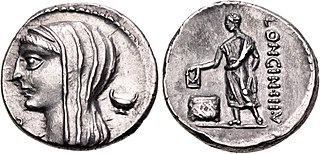Related Research Articles

Gaius Marius was a Roman general and statesman. Victor of the Cimbric and Jugurthine wars, he held the office of consul an unprecedented seven times. He was also noted for his important reforms of Roman armies. He set the precedent for the shift from the militia levies of the middle Republic to the professional soldiery of the late Republic; he also improved the pilum, a javelin, and made large-scale changes to the logistical structure of the Roman army.

Lucius Aemilius Paullus, also spelled Paulus, was a Roman consul twice, in 219 and 216 BC.

The gens Cassia was a Roman family of great antiquity. The earliest members of this gens appearing in history may have been patrician, but all those appearing in later times were plebeians. The first of the Cassii to obtain the consulship was Spurius Cassius Vecellinus, in 502 BC. He proposed the first agrarian law, for which he was charged with aspiring to make himself king, and put to death by the patrician nobility. The Cassii were amongst the most prominent families of the later Republic, and they frequently held high office, lasting well into imperial times. Among their namesakes are the Via Cassia, the road to Arretium, and the village of Cassianum Hirpinum, originally an estate belonging to one of this family in the country of the Hirpini.

The gens Manlia was one of the oldest and noblest patrician houses at Rome, from the earliest days of the Republic until imperial times. The first of the gens to obtain the consulship was Gnaeus Manlius Cincinnatus, consul in 480 BC, and for nearly five centuries its members frequently held the most important magistracies. Many of them were distinguished statesmen and generals, and a number of prominent individuals under the Empire claimed the illustrious Manlii among their ancestors.
Gaius Servilius Glaucia was a Roman politician who served as praetor in 100 BC. He is most well known for being an illegal candidate for the consulship of 99 BC. He was killed during riots and political violence in the year 100 BC while pursuing consular candidacy.
The ovation was a form of the Roman triumph. Ovations were granted when war was not declared between enemies on the level of nations or states; when an enemy was considered basely inferior ; or when the general conflict was resolved with little or no danger to the army itself. The Ovation could also be given rather than a triumph when there were extenuating circumstances, such as when Marcus Marcellus was given an ovation in lieu of a triumph as his army remained in Sicily and therefore was unable to cross the pomerium.
Gaius Norbanus, nicknamed Balbus was a Roman politician who was elected consul in 83 BC alongside Lucius Cornelius Scipio Asiaticus. He committed suicide in exile at Rhodes after being proscribed by Lucius Cornelius Sulla shortly after the latter's victory in the civil war.

Thomas Robert Shannon Broughton, FBA was a Canadian classical scholar and leading Latin prosopographer of the twentieth century. He is especially noted for his definitive three-volume work, Magistrates of the Roman Republic (1951-1986).

Gaius Julius Caesar(; Latin: [ˈɡaːiʊs ˈjuːliʊs ˈkae̯sar]; c. 140 BC – 85 BC) was a Roman senator, a supporter of his brother-in-law, Gaius Marius, and the father of Roman dictator Julius Caesar.
Marcus Fulvius Flaccus was a Roman senator and an ally of the Gracchi. He served as consul in 125 BC and as plebeian tribune in 122 BC.
Aulus Postumius Albinus was a Roman senator and military commander. In 110 BC, he went to serve on the staff of his brother, Spurius, in the war against the Numidian king Jugurtha. Left in charge of the troops during the winter, Aulus decided on a rash foray which involved the army in a humiliating defeat and surrender. The disaster led to the establishment of a commission which condemned several prominent aristocrats of collusion with the enemy during the war. Aulus himself was seemingly not condemned, and went on to be elected consul a decade later, in 99 BC. In 89, Aulus held command of a fleet during the Social War in Italy, but proved to be an unpopular commander and was murdered by his troops.
Lucius Valerius Flaccus was the suffect consul who completed the term of Gaius Marius in 86 BC. In the Roman Republic, Marius had fought a series of civil wars against Lucius Cornelius Sulla Felix, both leaders of their respective factions. Flaccus was considered a staunch supporter of Marius and Lucius Cornelius Cinna, the latter of whom shared his consulate and succeeded Marius as faction leader.
Publius Cornelius Scipio Asina was a Roman politician and general who served as consul in 221 BC, and as such campaigned against the Histri, a people in the northern Adriatic. Asina belonged to the Scipionic-Aemilian faction which dominated Roman politics at the beginning of the Second Punic War, and advocated for an aggressive policy against Hannibal. This stance led him to oppose the more prudent strategy of Fabius Maximus. He was notably appointed Interrex in 216 BC, probably in order to manipulate the elections.
The gens Numitoria was an ancient but minor plebeian family at ancient Rome. The first member of this gens to appear in history was Lucius Numitorius, elected tribune of the plebs in 472 BC. Although Numitorii are found down to the final century of the Republic, none of them ever held any of the higher magistracies.

Aulus Manlius Torquatus Atticus was a politician during the Roman Republic. Born into the prominent patrician family of the Manlii Torquati, he had a distinguished career, becoming censor in 247 BC, then twice consul in 244 and 241 BC, and possibly princeps senatus in 220 BC. Despite these prestigious magistracies, little is known about his life. He was a commander who served during the First Punic War, and might have pushed for the continuation of the war even after Carthage had sued for peace following the Roman victory at the Aegate Islands in 241 BC. The same year, he suppressed the revolt of the Faliscans in central Italy, for which he was awarded a triumph. At this occasion, he may have introduced the cult of Juno Curitis at Rome.
Marcus Horatius Turrinus Barbatus was a Roman senator from the early Republic, who served as consul in 449 BC alongside Lucius Valerius Poplicola Potitus. According to Roman historical tradition, he and Valerius played an important role in ending the Decemvirate and bringing harmony between the patrician and plebeian orders. To the two consuls are traditionally attributed the Valerio-Horatian Laws, which gave full force of law to measures passed by plebiscite, restored the right of any citizen to appeal to the people, and confirmed the sacrosanctity of plebeian tribunes. The historicity of these laws has been doubted.
Publius Servilius Geminus was a Roman statesman and general during the middle era of the Roman Republic. He was one of the two consuls of 252 BCE, serving with Gaius Aurelius Cotta. They fought against the Carthaginians in the ongoing First Punic War; Geminus and Cotta were very successful; they took several Carthaginian strongholds on Sicily. In 248 he obtained the consulship a second time, together with his former colleague, Aurelius Cotta, and again fought in Sicily against the Carthaginians.